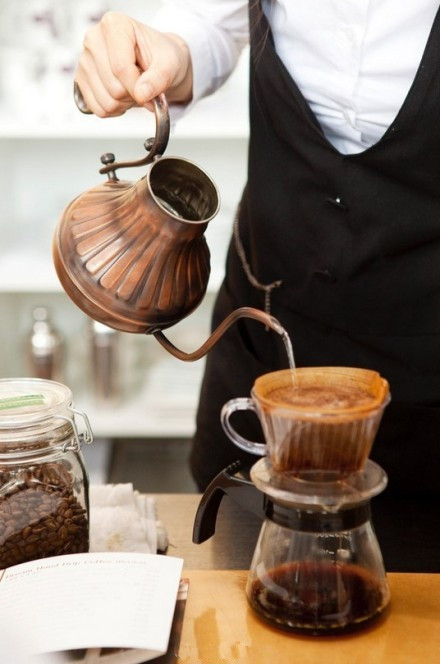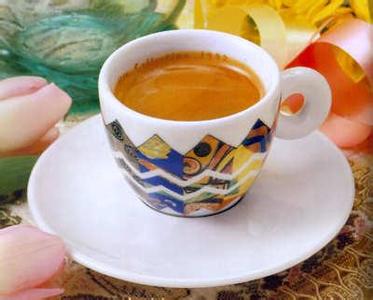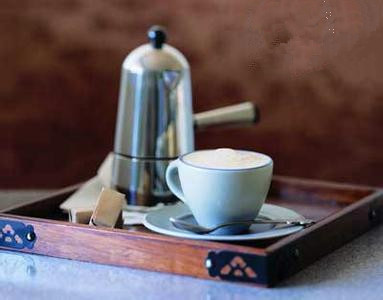The method of hand brewing coffee by hand
Follicle coffee seems to be the most unknowledgeable coffee. Some people nicknamed it lazy coffee (probably because there are the least utensils to clean after making a cup of coffee). Because it doesn't have to go through a sophisticated machine (such as an Italian coffee maker), nor does it seem to use any special equipment (such as a siphon pot or a mocha pot). But if you use these seemingly such ideas to make a cup of follicular coffee. You are so wrong, and you'd better not expect too much of that cup of coffee.

Step 1: fold filter paper-take a piece of filter paper to spread out, first check whether the filter paper is broken or soiled, if there is moisture, it is best not to use it, so as not to waste the raw materials of a cup of coffee. First press the side of the filter paper forward or backward about the width of the joint edge. Then the month then folds the funnel of the filter paper in the opposite direction (backward or forward). Finally, spread the filter paper into a funnel by hand, put it in the filter and stick it close to the filter.
Step 2: calculate on the basis of 1215g coffee particles per cup of coffee. Put the right amount of coffee particles in the filter paper. For the fineness of coffee particle grinding, please refer to the coffee grinding section. Pick up the filter. Tap the filter on the edge of the palm to make the coffee particles denser because of vibration. Carefully place the coffee particles together with the filter on the filter pot.
Step 3: prepare water: as with other coffee making methods, it is best to use normal filtered water, calculate the amount of water at about 180ml per cup, and boil the water on the stove until 100oc boil.
Step 4: in the process of waiting for the water to boil. You can pour a small amount of hot water into the coffee pot, shake the filter pot, and then pour out the water to warm it. After warming the pot, we put the coffee particles and filters we have just shot on the filter pot, and all the pre-preparation work is completed.
Step 5: cool down for the first time: fold the pre-prepared towel into a square, wet it with cold water, put it on the kettle that has been boiled and take it away from the stove, cool it for 20 seconds and 30 seconds, and lower the water temperature to about 92 ℃ (the time can be controlled by a small clock. You can also use a cooking thermometer to measure the temperature.
Steaming: wet the coffee particles with cooled water and a very fine flow. The current starts at the center of the filter and spirals outward. The thinner the better, but the thickness should be stable and uninterruptible. The best amount of water is just wet and drenched all the coffee particles. At this point, the coffee particles will absorb and expand forever. In professional terms, this process is called steaming.
Step 6: keep warm. Put the filter pot on the stove to protect the plate. In addition, the coffee should be kept warm in the filter pot so as not to affect the taste of the coffee after cooling. The second cooling, after steaming, put the kettle on the wet towel to cool down, about 20 to 30 seconds, so that the water temperature dropped to about 85 ℃.
Step 7: brew: start injecting water from the center of the filter. Rotate outward from the center in the same direction, the flow can be a little thicker than when steaming, and it should be uniform and uninterruptible. The amount of water is one cup, about 150-180 milliliters.
After rotating the amount of water injected into the cup, the water level reaches the edge of the filter, and finally the water is injected in the middle. Complete the perfect brewing. The finished coffee is about a little more than the cup (brewing plus the amount of water collected). This is to leave some of the finished work for the brewer to try. When it is finished. The coffee particles left behind will form a beautiful semi-oval surface on the filter paper.
Tip-1: it is best to choose the water that boils for the first time, rather than boil it again with cold boiled water and do not use the boiling water that has been kept warm for some time in the electric thermos.
Tip-2: some readers may wonder why it is so difficult to boil the water. The purpose of cooling with a towel is to prevent coffee oranges from touching directly with boiling water and being scalded by boiling water, affecting the aroma and taste of coffee.
Tip-3: if most people are inexperienced, it is difficult to see whether coffee particles are completely wet, especially the expansion rate of coffee particles is very fast, and they should pay attention to the stability of the flow of water. Often there will be too much water or uneven situation. At this point, you can observe that the amount of water is most appropriate when coffee starts dripping into the pot through the filter, but no more than five drops. If the surface of the coffee is also wet, you can be sure that the steaming process has been completed.
Secret-4: how to control the stability of water output? Suggestion: it is best to take a standing posture when brewing. Because of the general height of tables and chairs, after putting on the filter pot and filter. If you brew in a sitting position, you may need to raise your hand too high. It can exert force with its wrists, so it is very accurate to inject water, and when it comes down to two or three cups, the hands may be unbearably sore. So it's best to use standing posture. The upper body naturally leans forward slightly, holding the kettle with the right hand, clamping the right upper arm on the side of the body, and gently holding the edge of the kettle with the left hand to support the weight of the kettle. If the kettle is really too heavy, the right hand cannot fully control it. Hold the right elbow with your left hand to support it. When brewing, it is not with the arm movement, but the upper half of the body is swaying back and forth to do the action around brewing, so that the action is the most smooth and effortless.
Tip-5: for follicular coffee, the most important thing is uniform and stable water flow control, because it is related to whether the coffee particles can roll evenly in the filter. If the coffee particles roll unevenly. It is easy to produce miscellaneous smell, and it can not be extracted completely. This is also why follicular coffee looks easy, but it is not easy to have a perfect cup of finished coffee.
Important Notice :
前街咖啡 FrontStreet Coffee has moved to new addredd:
FrontStreet Coffee Address: 315,Donghua East Road,GuangZhou
Tel:020 38364473
- Prev

Coffee brewing technology how to operate the Italian coffee machine to make coffee
The Italian coffee machine uses pressure to quickly pass the steam through the coffee particles and extract the best ingredients from the coffee, so the time for the steam to stay in the coffee particles directly affects the quality of the coffee. Step 1: scoop the coffee particles into the coffee filter cover, observe that the coffee exceeds the level of the lid, and cut off the excess coffee particles with a flat knife or spoon.
- Next

Brewing different espresso mocha pot brewing skills
Mocha pots are becoming more and more common. Everyone feels good about this novel and good-looking coffee pot, and some people don't know how to use it at all, but buy it back as a pure decoration in the living room or wine cabinet because of its unique shape. Step 1: prepare the filtered hot water, preferably using the clear water filtered by an ordinary household water filter, calculated at 30 mg per cup, and measure what you need.
Related
- What is the meaning of lactic acid fermentation with coffee bean treatment?
- How to judge the state of foam by sound?
- How does the latte pull out the unicorn pattern? Come to get for a little trick to improve the flower pull!
- Will flower pulling affect the taste of the latte?
- Do you know the history of coffee?
- The difference between honey treatment and sun washing what is raisin honey treatment?
- What kind of milk can a novice use to make coffee foam to keep the foam longer? The correct method and skills of milking tutorial sharing
- Why do washed coffee beans taste sour? Flavor characteristics of washed Coffee
- Introduction to the skill of how to practice the size and height of water injection around the circle of hand-brewed coffee
- How do beginners practice coffee flower drawing from scratch?

